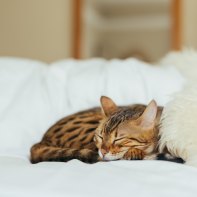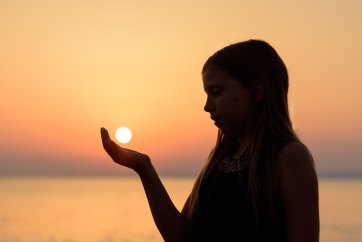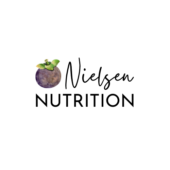Seasonal Affective Disorder, sometimes referred to as the “winter blues,” is a reoccurring seasonal depressive disorder that results in feelings of sadness, lethargy and even overeating and chronic aches and pains. Women are more likely to suffer from S.A.D. as are those living far from the equator, working in shift work, or who suffer from other mental illnesses [1].
Well…that’s fine and dandy but what can you DO about this crummy feeling of your emotions being so connected to the weather?
Move to Aruba. Easy peasy.

However… if that that’s not realistic or feasible how about take back some control and give your body and brain a boost by supporting your neurotransmitters, hormones and vitamins that may be lacking during this gloomy time of year. You can’t change the weather and if you’ve ever experienced any type of true depression you know that you can’t just “pull yourself up by your boot straps” or “smile through it.”
Melatonin: ….long pause. I know you’re thinking: “Emily wait! I’m already tired and can’t get out of bed! Don’t make me sleepier!” Don’t leave me yet! Melatonin supplementation has shown to be a valuable therapeutic treatment for SAD. Those with diagnosed Seasonal Affective Disorder are more likely to overproduce melatonin causing daytime sleepiness and feelings of fatigue. While it may seem counter-intuitive to take more melatonin studies have shown that actually taking 3mg of melatonin 45 minutes before bed will help regulate your sleep cycle and circadian rhythm, decreasing daytime production of the sleepy hormone [3]. Not all melatonin supplements are created equal so please don’t hit the Walmart and think it’s a bust if your melatonin supplement doesn’t make a positive impact. I see SO many clients with altered digestion / absorption that I always prefer a liposomal or meltaway tab that is more directly assimilated via the mucous membrane in the mouth. As for brands and sourcing, dosage and quantity…well that always depends on the individual. Feel free to contact me with any questions regarding melatonin supplementation!



Vitamin D: I like never..ever..never ever never make sweeping nutrient recommendations because everyone is so different and their unique nutritional needs are their own and no one elses. EXCEPT…maybe with Vitamin D. Vitamin D is a crucial part of overall health (like if you pubmed search “vitamin D” and “any disease ever” there is a correlation). Not surprisingly low blood levels (below 30 ng/mL) have been correlated with increased risk of depression. Because we get so much of our Vitamin D from the sun supplementing with Vitamin D may be highly effective for treatment and even prevention of SAD which is thought to be linked to decreased sun exposure. Also if you live in above the 37 parallel in the US you just AREN’T getting enough D…even in the summer …to sustain you through the winter months or so says Harvard. Because the quality and dosing of Vitamin D varies widely please see your nutritionist or healthcare provider for brand and dose recommendations. I will you give you this if you’re not getting a little buzz of energy from your Vitamin D you’re probably taking the wrong one! It needs to be bound to a fat source for absorption and the very best brands are in liquid form.

*You can over-supplement with Vitamin D so it’s best practice to have a healthcare professional help with dosing.
Nutrition: Eating as many fresh foods as you can during this season may help you trick your body in to thinking it’s summer!
Just kidding, that’s not a thing.
What is true is that fresh, colorful foods are higher in B-vitamins which correlates to increased energy and mood enhancement. Fresh, whole foods also decrease inflammation which eases those aches and pains that are often associated with S.A.D.’s. Trying new things and having new experiences has also been shown to help hack the brain into forgetting about the doom and gloom that is trying to invade your normally happy hormone production. (That IS a real thing). So have you ever had a persimmon? Fresh pomegranate? The apples this time a year may be mushy and have been in cold storage TOO long but the oranges are delightful! Try something new from the store that appeals to your senses and let it feed your body and your soul.
Integrative Therapies: Other therapies such as massage, counseling, and light therapy have all shown moderate to significant levels of effectiveness for treatment of SAD and are worth exploring [3]. Even moderate intensity exercise like yoga, walking (bonus points for getting outside…great research is emerging about earthing / grounding for increased health in everything from mood to cardiovascular health) for 30 minutes a day has been shown to significantly decrease feelings of depression and that foggy brain you feel as a result from the winter blues (1). If you really want to set your circadian clock up right try to exercise at the same time each day!
You Aren’t Alone – So Don’t Try to “Go It Alone”
Seasonal Affective Disorder affects hundreds of thousands of indiviuals and even mild cases can make you vulnerable to significant depression [2]. Please, please, seek out a healthcare professional that you feel safe talking to if you feel you are suffering from symptoms of this disorder no matter how mild you feel they are.
Craft, L. L., & Perna, F. M. (2004). The Benefits of Exercise for the Clinically Depressed. Primary Care Companion to The Journal of Clinical Psychiatry, 6(3), 104–111.
Melrose, S. (2015). Seasonal Affective Disorder: An Overview of Assessment and Treatment Approaches. Depression Research and Treatment, 2015, 178564. http://doi.org/10.1155/2015/178564
Pizzorno, J. E., Murray, M. T., & Joiner-Bey, H. (2016). The clinician’s handbook of natural medicine. St. Loius, MO: Elsevier.
If you’re interested in which brands I typically recommend feel free to sign up for my online dispensary. Do note that while you can shop for food, personal care items, and quality supplements you need to remember that just because a supplement is natural doesn’t mean it is safe or useful for you. By signing up for an account with my dispensary you are agreeing that you will only buy personal care, food items or multivitamins / probiotics and may do so at your own discretion. Any targeted supplement purchases for therapeutic treatment of a symptom or disease state MUST be approved by myself prior to purchase. Disregarding this rule will result in your immediate removal from the platform.

